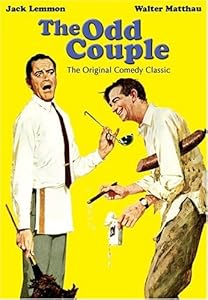This series looks at a small snippet of The book on the Perfectionist Personality, aka The Obsessive Compulsive disordered Personality, aka OCPD, each week. Please follow along, leave your comments, engage more on the FaceBook website... whatever your heart calls you to do.
Too Perfect, When Being in Control Gets Out of Control by Allan E. Mallinger, M.D. and Jeanette DeWyze was published by Random House in 1992. If you believe you are dealing with OCPD or someone who is "Too Perfect," whether that's you or a loved one, please buy a copy of the book and read it for additional insights that will not all be covered in these excerpts.
Orderliness and Rigidity
Cover of The Odd Couple
Remember Felix Unger of The Odd Couple? He was the archetypal obsessive type - so perfectionistic that "I cooked myself out of a marriage," he complains in Neil Simon's stage play. "Nothing was ever right.... The minute she walked out of the kitchen I would recook everything." He was so tightfisted with money that he literally made his wife keep track of every penny; so safety-conscious he wore a seat belt at drive in movies. But, more than anything else, Felix obviously - and comically - illustrated what it's like to be too orderly. His passion for cleanliness and organization drive his wife to seek divorce and his roommate to commit mayhem.
<Felix's orderliness is an extreme example of a commendable trait found in many obsessives. Like Felix, some obsessives have a need for orderliness so great it puts both them and others under undue stress. Furthermore, once they've established a certain order, whether in their surroundings, actions, or thoughts, they are loath to change it. They become rigid, and this rigidity can be very self-damaging.
Neat Freaks
<snip> "I'm like a cat," one patient told me. "I spend most of my time on maintenance - grooming myself, keeping my things neat and clean and in good repair. There's not much time left over for living."
That patient felt oppressed by the burden of maintaining an impeccable world. Others - the Felix Ungers of the world - may enjoy cleaning and straightening, but drive others to distraction with their insistence on orderliness. Such people can't resist tidying up while the party is still in progress, or chastising children for the "mess" created by their play.
<snip> Rita also was not overly concerned about the neatness of her surroundings, but she was meticulous in the extreme about the organization of her computer files. When she began to write a book, she told herself that she needed to be able to find any given quote from among her voluminous material quickly, so she spent several months developing a complex system for cross-indexing all her interview notes. The result would have dazzled any data processing specialist, but Rita later admitted that she rarely used the cross-referencing features, and that all the time spent developing the files contributed to her delivering the manuscript almost a year behind schedule.
Straightening, classifying, and otherwise organizing things are favorite activities for many obsessives. Such task clearly have intrinsic value; it's easier to find and use possessions or pieces of information if they're arranged in good order. But those activities also may impart a symbolic reassurance that one can order life in its greater aspects - that the unexpected catastrophe can be avoided.
***
| A domesticated cat grooming. (Photo credit: Wikipedia) |
I have heard of OCPD hosts who will obsessively begin clearing plates the minute someone sets a fork down. No sitting around the table, chatting, perhaps allowing guests time/space to decide if they want a second helping or another glass of wine. And yes, normal kid clutter totally freaks them out, which is why mixing un- or under-treated OCPD and young children is a very, very bad idea. (They don't do real well with teenagers, either, even when the teens are not mouthy and rebellious.)
The story of Rita, the story of a lot of OCPD'rs, including my ex, was to obsessively arrange and futz over one small piece of something (aka, churning) and in the meantime, this big mess over HERE... ignored.
When you spend all your time fussing over X, you run out of time to attend to Y. Deliberate? Or a case of broken filters? One of the current descriptions of OCPD is not being able to see the forest for the trees, or sometimes not even being able to see the trees for the leaves. Or is it a way of procrastinating, to get out of doing something one really doesn't want to do, as I will write and comment on blogs rather than do my filing?
| High quality ostrich feather duster (Photo credit: Wikipedia) |
Do you have an experience with Orderliness on Steroids,
your own or another's?
your own or another's?
How do you get past it?
Other thoughts?



